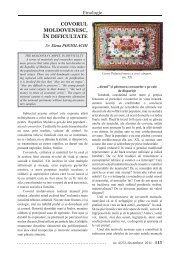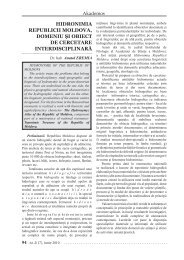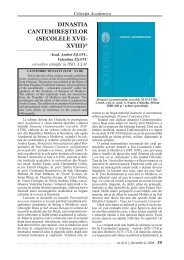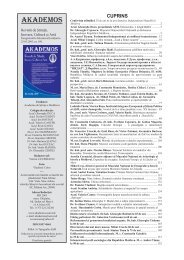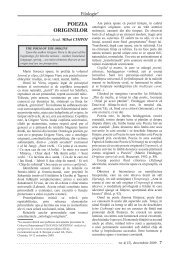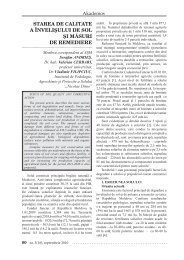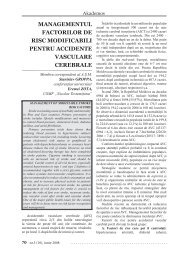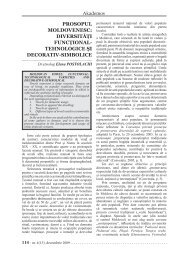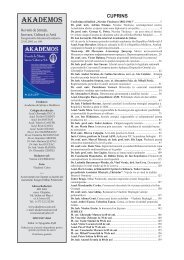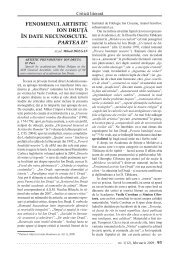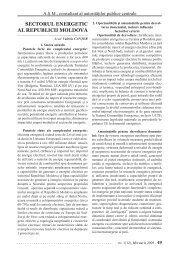Academos 3 2008.indd - Akademos - Academia de ÅtiinÅ£e a Moldovei
Academos 3 2008.indd - Akademos - Academia de ÅtiinÅ£e a Moldovei
Academos 3 2008.indd - Akademos - Academia de ÅtiinÅ£e a Moldovei
Create successful ePaper yourself
Turn your PDF publications into a flip-book with our unique Google optimized e-Paper software.
Etatea Repere în literatura şi obiective universală<br />
I strove with none, for none was worth my<br />
strife:<br />
Nature I loved and next to Nature, Art:<br />
I warmed both hands before the fire of Life;<br />
It sinks and I am ready to <strong>de</strong>part.”<br />
Indian Summer as a period of quiet <strong>de</strong>tachment<br />
offers this serenity as peace of mind, showing us<br />
– in a famous poem by Storm – an old man sitting<br />
in front of his cottage at noon - the hour of Pan –,<br />
dreaming of his bees over brimming their clammy<br />
honeycombs… An image in<strong>de</strong>ed of what we call<br />
“Urvertrauen” in German and translate rather poorly<br />
into English as “basic security” – a rare gift in old<br />
age! This serenity does not know the hedonistic<br />
extreme, as we hear it in Santayana’s suggestion:<br />
“The only way to cure birth and <strong>de</strong>ath is to enjoy the<br />
interval.” Serenity helps with the intergenerational<br />
competition: Young men think that old men are<br />
fools; but old men know that young man are fools.<br />
Chapman, the great translator of Homer, said it<br />
1605.<br />
And serenity suggests that in old age nature has<br />
to be obeyed in or<strong>de</strong>r to be comman<strong>de</strong>d, and that<br />
the three best geriatric practitioners will always be:<br />
Doctor Quiet, Doctor Diet and Doctor Merryman!<br />
And when – eventually – the fire is dying in the<br />
grate, we may feel with Herakleitos that this is not<br />
annihilation but transition.<br />
Tennyson, Poet Laureate of Queen Victoria,<br />
wanted one of his last lyrics to conclu<strong>de</strong> all editions<br />
of his work. Here it is: a document of quiet serenity<br />
in senescence.<br />
“Crossing the Bar<br />
Sunset and evening star,<br />
And one clear call for me!<br />
And may there be no moaning of the bar,<br />
When I put out to sea,<br />
But such a ti<strong>de</strong> as moving seems asleep,<br />
Too full for sound and foam,<br />
When that which drew from out the boundless<br />
<strong>de</strong>ep<br />
Turns again home.<br />
Twilight and evening bell,<br />
And after that the dark!<br />
And may there be no sadness of farewell,<br />
When I embark;<br />
For though from out our bourne of Time and Place<br />
The flood may bear me far,<br />
I hope to see my pilot face to face<br />
When I have crossed the bar.”<br />
Tennyson never really i<strong>de</strong>ntified the pilot, by<br />
the way.<br />
And serenity in German writing? One of the rare<br />
great figures in our fiction, Dubslav von Stechlin<br />
in Fontane’s Der Stechlin represents to me this<br />
resigned maturity of Indian Summer people when<br />
he, receiving a new and stronger prescription for<br />
his heart condition takes the prescribed number of<br />
drops in a spoonful of water, tastes them like a new<br />
vintage of old wine, then tells his old servant in a<br />
won<strong>de</strong>rful innuendo “Well, Engelke, here we are:<br />
Foxglove … Digitalis.”<br />
6.<br />
Yes – digitalis purpurea: Old age, heart<br />
condition, multimorbidity, amnesia and senility and<br />
the arteries petrified, narrowing: “Slowly the poison<br />
the whole bloodstream fills: / The waste remains,<br />
the waste remains and kills…” (Empson). 130 years<br />
ago, Matthew Arnold, the great Victorian, in his<br />
poem Growing Old (1867) could say:<br />
“What is it to grow old?<br />
Is it to lose the glory of the form,<br />
The lustre of the eye?<br />
Is it for beauty to forego her wreath?<br />
– Yes, but not this alone. …<br />
It is to spend long days<br />
And not once feel that we were ever young;<br />
It is to add, immured<br />
In the hot prison of the present, month<br />
To month with weary pain.<br />
It is to suffer this,<br />
And feel but half, and feebly what we feel.<br />
Deep in our hid<strong>de</strong>n heart<br />
Festers the dull remembrance of a change,<br />
But no emotion – none.”<br />
And T. S. Eliot, drawing the portrait of Gerontion<br />
– that is: “a little old man” – i<strong>de</strong>ntifies this prototype<br />
of senility with the <strong>de</strong>cline of Europe after World<br />
War I:<br />
“Here I am, an old man in a dry month, Being read<br />
to by a boy, waiting for rain. I was neither at the hot<br />
gates<br />
Nor fought in the warm rain<br />
Nor knee <strong>de</strong>ep in the salt marsh, heaving a cutlass,<br />
Bitten by flies, fought.<br />
My house is a <strong>de</strong>cayed house,<br />
And the jew squats on the window sill, the owner,<br />
Spawned in some estaminet of Antwerp,<br />
Blistered in Brussels, patched and peeled in<br />
London.<br />
The goat coughs at night in the field overhead;<br />
Rocks, moss, stonecrop, iron, merds.<br />
The woman keeps the kitchen, makes tea,<br />
Sneezes at evening, poking the peevish gutter.<br />
I an old man,<br />
A dull head among windy spaces.”<br />
nr.3 (10), iunie 2008 - 17



